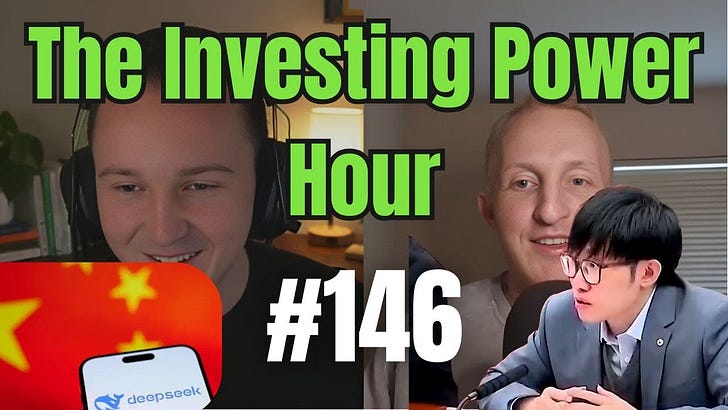Earnings Round-Up: American Express, Visa, and Mastercard (V, AXP, MA)
No points gifted for originality
YouTube
Spotify
Apple Podcasts
Above you will find links to our weekly Power Hour podcast. There is some discussion on the DeepSeek news that likely aged poorly, as well as earnings talk. There was not much mention of tariffs, but I’m sure we will discuss them this week.
We are going to be talking A TON of earnings in the next few weeks. Come listen to the show if you have not already.
The largest takeaway from earnings so far has been the three payment giants (American Express, Visa, and Mastercard). These are incredible businesses that keep chugging along with minimal outside competition.
Oh, and they have close to permanent inflation protection.
American Express Q4 2024:
Total billed business (card volume): 8% YoY growth
Net write-off rate of 1.9% compared to 2.1% in Q4 2019
Net card fee growth of 18% YoY
Visa Q1 2025:
9% payment volume growth
7% growth in total cards in circulation (2024 vs. 2023)
Mastercard Q4 2024:
12% volume growth
6% cards in circulation growth
When it comes to the three payment giants, there are intelligent discussions on the intricacies of card payments, threats from private and government alternatives, and the future of the digital payments sector.
I am here to tell you I don’t care about any of it. They don’t matter.
These are fantastic businesses with reinforcing moats. Their competitive advantages tighten as they get bigger and the business model is protected from inflation. Sorry if I don’t really care about the latest update on a fintech integration.
Did volume grow this quarter? Did more cards get added in circulation? Yes to both? That’s all I need to know. Next.
American Express is a 100 bagger since Buffett bought it and has returned a 21% total return CAGR in the last five years.
Visa’s stock has generated a 21.6% total return CAGR since going public in 2008.
Mastercard is a 100-bagger and has generated a 29.9% total return CAGR since its IPO in 2006. Sheesh.
Given the “known” business quality, you get rare occasions when these three stocks are dirt cheap. American Express was certainly cheap in October 2023.
Visa and Mastercard may have been cheap for a brief moment in October of 2022, 2016, and 2011. It is quite rare for these two to trade at a significant discount to their forward earnings potential, or at least compared to the S&P 500.
I get it, the stocks have done well for investors in the past even if you bought at an elevated multiple. Duh, they trade at elevated multiples today. I am greedy, though, and want a margin of safety if business quality actually does deteriorate.
There are no points for originality. Visa, Mastercard, and American Express are some of the best businesses on the planet and I think they will remain some of the best for the next 10, 20, and 30 years.
If Mr. Market brings me an opportunity to buy shares for either of these three stocks at a discount, I hope I have the conviction to strike and add them to my portfolio.
-Brett
Chit Chat stocks is presented by:
Public.com has just launched its BOND ACCOUNT. Lock-in interest rates of 6% or higher (as of 9/30/24) by signing up today!
With as little as $1,000, the bond account allows you to buy a diversified portfolio of bonds and lock in your yield even if the Federal Reserve cuts rates.
It only takes a couple of minutes, get started today at Public.com/chitchatstocks and open up a bond fund today!
A Bond Account is a self-directed brokerage account with Public Investing, member FINRA/SIPC. Deposits into this account are used to purchase 10 investment-grade and high-yield bonds. As of 9/26/24, the average, annualized yield to worst (YTW) across the Bond Account is greater than 6%. A bond’s yield is a function of its market price, which can fluctuate; therefore, a bond’s YTW is not “locked in” until the bond is purchased, and your yield at time of purchase may be different from the yield shown here. The “locked in” YTW is not guaranteed; you may receive less than the YTW of the bonds in the Bond Account if you sell any of the bonds before maturity or if the issuer defaults on the bond. Public Investing charges a markup on each bond trade. See our Fee Schedule. Bond Accounts are not recommendations of individual bonds or default allocations. The bonds in the Bond Account have not been selected based on your needs or risk profile. See https://public.com/disclosures/bond-account to learn more.




